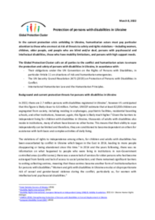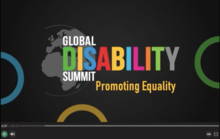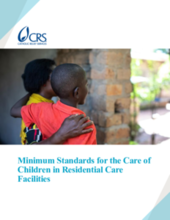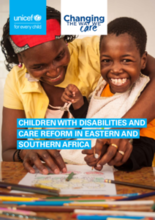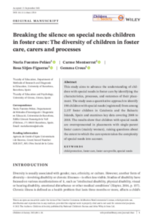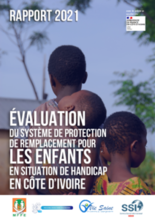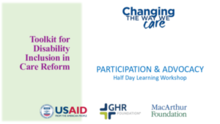Displaying 81 - 90 of 499
In the current protection crisis unfolding in Ukraine, humanitarian actors must pay particular attention to those who are most at risk of threats to safety and rights violations – including women, children, older people, and people who are blind and/or deaf, persons with psychosocial and intellectual disabilities, those who have mobility limitations, and persons with high support needs. In this brief, the Global Protection Cluster calls on all parties to the conflict and humanitarian actors to ensure the protection and safety of persons with disabilities in Ukraine.
There are limited studies which investigate the perceived needs and wellbeing of parents caring for their children with disability from culturally and linguistically diverse communities. This qualitative study uniquely explored the experiences and cultural factors of Vietnamese parents caring for children with a disability in multicultural Australia.
The goal of the summit was to lead lasting change in the lives of millions of people with disabilities. To succeed, it is crucial that governments, international organizations, civil society and private business commit themselves to increased efforts to promote inclusion and rights-based development.
In this best practice article, the challenges faced by these children with disabilities and the potential for inclusion within the CCI are discussed based on the field action project intervention of the Tata Institute of Social Sciences (TISS), Mumbai, with selected government CCIs. The article suggests a multi-pronged intervention approach for the Children with disability (CWD) at the levels of the individual CWD, peer group, CCI and the juvenile justice (JJ) System, which are together recognised as the stakeholders of an ‘inclusive ecosystem’. The article arrives at the ‘Inclusive Ecosystem Model of Rehabilitation’ by drawing from the individual–environment interaction model of disability.
This document presents a set of minimum standards of care, which it is recommended that residential care facilities (RCFs) strive to adopt, particularly those RCFs engaged with or receiving support from CRS. The standards are designed to be applicable to a variety of residential care settings and are recommended to be used to promote care practices and approaches that contribute to positive child well-being.
This Toolkit for Disability Inclusion in Care Reform represents a collection of work developed from the experience of many practitioners and organizations. The aim of this toolkit is to increase the capacity and confidence of those working in children’s care, child protection and family strengthening to mainstream disability through every step, utilizing improvements to systems, practices, skills and attitudes. We envision family care for all children and the use of residential care only as a last resort when absolutely necessary and appropriate. The toolkit reinforces the importance of placing family care for children with disabilities at the top of any care reform agenda.
This paper highlights the importance of placing support for children with disabilities and their families at the centre of care reform efforts, and provides examples from across the region of how this can be done.
This study aims to advance the understanding of children with special needs in foster care by identifying the characteristics, processes, and outcomes of their placement. The study uses a quantitative approach to identify 190 children with special needs (registered) from among 2,157 foster children in Catalonia and the Balearic Islands, Spain and examines key data covering 2008 to 2018. The results show that children with special needs are overrepresented in placements with single-parent foster carers (mainly women), raising questions about the extent to which the care system takes the complexity of special needs into account.
Cette évaluation dresse un tableau de la situation en Côte d'Ivoire des enfants handicapés privés de soins parentaux ou risquant d'être séparés de leur famille, ainsi que des options de prise en charge alternative disponibles.
This is a presentation for a half-day workshop on participation and self-advocacy approaches for working with children with disabilities and their families; includes slides, facilitation notes and a sample list of country-specific disability rights.

